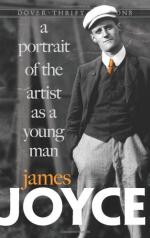How could he hit their conscience or how cast his shadow over the imaginations of their daughters, before their squires begat upon them, that they might breed a race less ignoble than their own? And under the deepened dusk he felt the thoughts and desires of the race to which he belonged flitting like bats across the dark country lanes, under trees by the edges of streams and near the pool-mottled bogs. A woman had waited in the doorway as Davin had passed by at night and, offering him a cup of milk, had all but wooed him to her bed; for Davin had the mild eyes of one who could be secret. But him no woman’s eyes had wooed.
His arm was taken in a strong grip and Cranly’s voice said:
—Let us eke go.
They walked southward in silence. Then Cranly said:
—That blithering idiot, Temple! I
swear to Moses, do you know, that
I’ll be the death of that fellow one time.
But his voice was no longer angry and Stephen wondered was he thinking of her greeting to him under the porch.
They turned to the left and walked on as before. When they had gone on so for some time Stephen said:
—Cranly, I had an unpleasant quarrel this evening.
—With your people? Cranly asked.
—With my mother.
—About religion?
—Yes, Stephen answered.
After a pause Cranly asked:
—What age is your mother?
—Not old, Stephen said. She wishes me to make my easter duty.
—And will you?
—I will not, Stephen said.
—Why not? Cranly said.
—I will not serve, answered Stephen.
—That remark was made before, Cranly said calmly.
—It is made behind now, said Stephen hotly.
Cranly pressed Stephen’s arm, saying:
—Go easy, my dear man. You’re an excitable bloody man, do you know.
He laughed nervously as he spoke and, looking up into Stephen’s face with moved and friendly eyes, said:
—Do you know that you are an excitable man?
—I daresay I am, said Stephen, laughing also.
Their minds, lately estranged, seemed suddenly to have been drawn closer, one to the other.
—Do you believe in the eucharist? Cranly asked.
—I do not, Stephen said.
—Do you disbelieve then?
—I neither believe in it nor disbelieve in it, Stephen answered.
—Many persons have doubts, even religious persons, yet they overcome them or put them aside, Cranly said. Are your doubts on that point too strong?
—I do not wish to overcome them, Stephen answered.
Cranly, embarrassed for a moment, took another fig from his pocket and was about to eat it when Stephen said:
—Don’t, please. You cannot discuss this question with your mouth full of chewed fig.
Cranly examined the fig by the light of a lamp under which he halted. Then he smelt it with both nostrils, bit a tiny piece, spat it out and threw the fig rudely into the gutter.




